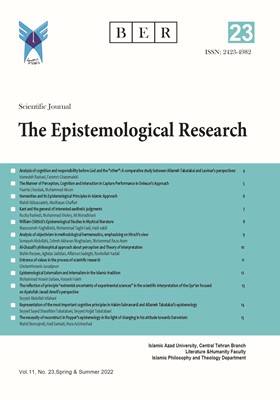The necessity of reconstruct in Popper's epistemology in the light of changing in his attitude towards Darwinism
Subject Areas : Epistemological researchesmahdi boroujerdi 1 * , Hadi Samadi 2 , Reza Azizinezhad 3
1 - Ph.D candidate of philosophy of science department, Faculty of law, theology and political sciences, Sciences and Researches Branch, Islamic Azad university, Tehran, Iran
2 - Assistant professor at Department of Philosophy of science, Faculty of Law, Theology and Political Sciences, Science and Research Branch, Islamic Azad University, Tehran, Iran
3 - Assistant Professor of Biology, Faculty of Agriculture, Sciences and Researches branch, Islamic Azad University, Tehran, Iran
Keywords: Truth, Evolutionary epistemology, popper. biological evolution, Darwinism,
Abstract :
Our understanding of changes that occurred in Popper's thought on biological evolution can help us to discover some neglected aspects of his philosophical system. The article argues that some of Popper's epistemological views have changed over his intellectual life on his attitude towards evolution. These intellectual changes have been occurred from the belief in the possibility of not using truth and falsehood in his initial opinions, to emphasizing the issue of truth and truthfulness in his middle career, and finally moving more and more from a proposition-oriented perspective to non-propositional evolutionary perspectives in his late life. In later Popper, we see a mature evolutionary perspective that is original, and completely different from his earlier reading of Darwinism. These changes have consequences for Popper's thought system, especially in the field of epistemology. On the other hand, the originality of Popper’s reading of Darwinism is rooted in some of his philosophical thoughts. Per Popper's view adaptation is produced as the result of a problem-solving process and biological evolution is the product of an epistemological process. The article is an attention to the reconstruction of Popper's philosophical system in the light of his understanding of his invented reading of evolution; a reading that is conform to some of the new developments in evolutionary biology.
پوپر، کارل. (۱۳۸۰). جامعه باز و دشمنانش. (عزت الله فولادوند، مترجم). تهران: شرکت سهامی انتشارات خوارزمی.
--------. (۱۳۶۹). جستجوی ناتمام. (ضیاء موحد، ویراستار، ایرج علی آبادی، مترجم). سازمان انتشارات و آموزش انقلاب اسلامی.
--------. (۱۳۸۱الف). جهان گرایشها، دو پژوهش درباره علیت و تکامل. (عباس باقری، مترجم). تهران: فرزان روز.
--------. (۱۳۸۱ب). جهان گرایشها، دو پژوهش درباره علیت و تکامل. (عباس باقری، مترجم). فرزان روز.
---------. (۱۳۹۷). زندگی سراسر حل مسئله است. (شهریار خواجیان، مترجم). مرکز.
---------. (۱۳۷۴). شناخت عینی، برداشتی تکاملی. (احمد آرام، مترجم). علمی و فرهنگی.
میلر، دیوید. (۲۰۰۷). "غلبه بر اعتیاد به موجه سازی". فلسفه تحلیلی، 4(0)، 137-148.
Popper, Karl. (1957). The Poverty of Historicism. BOSTON: THE BEACON PRESS.
---------------. (1972). Objective Knowledge: An Evolutionary Approach (Revised edition). Oxford Eng. : New York: Oxford University Press.
---------------. (1978). "Natural Selection and the Emergence of Mind". Dialectica, 32(34), 339–55.
---------------. (1982). Unended Quest: An Intellectual Autobiography. La Salle: Open Court.
---------------. (1984). The Self and Its Brain: An Argument for Interactionism
(1 edition). London: Routledge.
---------------. (1995). In Search of a Better World (1 edition). London: Routledge.
---------------. (2005). The Logic of Scientific Discovery. Taylor and Francis.
Ruse, Michael. (1977). "Karl Popper’s Philosophy of Biology." Philosophy of Science, 44(4), 638-661.
_||_
